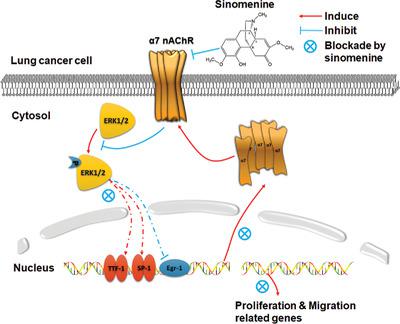当前位置:
X-MOL 学术
›
J. Leukoc. Biol.
›
论文详情
Our official English website, www.x-mol.net, welcomes your
feedback! (Note: you will need to create a separate account there.)
Inhibitory effect of sinomenine on lung cancer cells via negative regulation of α7 nicotinic acetylcholine receptor
Journal of Leukocyte Biology ( IF 3.6 ) Pub Date : 2020-07-29 , DOI: 10.1002/jlb.6ma0720-344rrr Shasha Bai 1 , Wenhao Wen 1 , Xuenan Hou 1 , Jiexiu Wu 1 , Lang Yi 1 , Yingkun Zhi 1 , Yanjun Lv 1 , Xiaoqin Tan 1 , Liang Liu 2 , Peixun Wang 1 , Hua Zhou 2 , Yan Dong 1
Journal of Leukocyte Biology ( IF 3.6 ) Pub Date : 2020-07-29 , DOI: 10.1002/jlb.6ma0720-344rrr Shasha Bai 1 , Wenhao Wen 1 , Xuenan Hou 1 , Jiexiu Wu 1 , Lang Yi 1 , Yingkun Zhi 1 , Yanjun Lv 1 , Xiaoqin Tan 1 , Liang Liu 2 , Peixun Wang 1 , Hua Zhou 2 , Yan Dong 1
Affiliation

|
Lung cancer is the leading cause of cancer deaths worldwide, with a high morbidity and less than 20% survival rate. Therefore, new treatment strategies and drugs are needed to reduce the mortality of patients with lung cancer. α7 nicotinic acetylcholine receptor (α7 nAChR), as a receptor of nicotine and its metabolites, is a potential target for lung cancer treatment. Our previous studies revealed that sinomenine plays anti‐inflammation roles via α7 nAChR and down‐regulates the expression of this receptor, thus increasing the inflammatory response. Hence, sinomenine is possibly a natural ligand of this receptor. In the present study, the effects of sinomenine on lung cancer A549 cells and tumor‐bearing mice were determined to investigate whether this alkaloid has an inhibitory effect on lung cancer via α7 nAChR. CCK‐8 assay, wound‐healing test, and flow cytometry were performed for cell proliferation, cell migration, and apoptosis analysis in vitro, respectively. Xenograft mice were used to evaluate the effects of sinomenine in vivo. Results showed that sinomenine decreased cell proliferation and migration abilities but increased the percentage of apoptotic cells. Tumor volume in tumor‐bearing mice was significantly reduced after sinomenine treatment compared with that in the vehicle group mice (p < 0.05). Furthermore, the effects of sinomenine were abolished by the α7 nAChR antagonist mecamylamine and the allosteric modulator PNU‐120596, but no change occurred when the mice were pretreated with the muscarinic acetylcholine receptor antagonist atropine. Meanwhile, sinomenine suppressed α7 nAChR expression in vitro and in vivo, as well as the related signaling molecules pERK1/2 and ERK1/2 and the transcription factors TTF‐1 and SP‐1. By contrast, sinomenine up‐regulated the expression of another transcription factor, Egr‐1. These effects were restricted by mecamylamine and PNU but not by atropine. Results suggested that sinomenine can inhibit lung cancer via α7 nAChR in a negative feedback mode.
中文翻译:

青藤碱负调控α7烟碱乙酰胆碱受体对肺癌细胞的抑制作用
肺癌是全球癌症死亡的主要原因,发病率高,生存率低于20%。因此,需要新的治疗策略和药物来降低肺癌患者的死亡率。 α7烟碱乙酰胆碱受体(α7 nAChR)作为尼古丁及其代谢物的受体,是肺癌治疗的潜在靶点。我们前期的研究表明,青藤碱通过α7 nAChR发挥抗炎作用,并下调该受体的表达,从而增强炎症反应。因此,青藤碱可能是该受体的天然配体。本研究通过测定青藤碱对肺癌A549细胞和荷瘤小鼠的影响,探讨该生物碱是否通过α7 nAChR对肺癌产生抑制作用。 CCK-8检测、伤口愈合试验和流式细胞术分别用于体外细胞增殖、细胞迁移和凋亡分析。使用异种移植小鼠来评估青藤碱的体内作用。结果表明,青藤碱降低了细胞增殖和迁移能力,但增加了凋亡细胞的百分比。与载体组小鼠相比,青藤碱治疗后荷瘤小鼠的肿瘤体积显着减小( p < 0.05)。此外,青藤碱的作用被α7 nAChR拮抗剂美加明和变构调节剂PNU-120596消除,但当小鼠用毒蕈碱乙酰胆碱受体拮抗剂阿托品预处理时,没有发生任何变化。同时,青藤碱在体外和体内抑制α7 nAChR以及相关信号分子pERK1/2和ERK1/2以及转录因子TTF-1和SP-1的表达。 相比之下,青藤碱上调另一种转录因子 Egr-1 的表达。这些作用受到美加明和 PNU 的限制,但不受阿托品的限制。结果表明,青藤碱可通过α7 nAChR以负反馈方式抑制肺癌。
更新日期:2020-07-29
中文翻译:

青藤碱负调控α7烟碱乙酰胆碱受体对肺癌细胞的抑制作用
肺癌是全球癌症死亡的主要原因,发病率高,生存率低于20%。因此,需要新的治疗策略和药物来降低肺癌患者的死亡率。 α7烟碱乙酰胆碱受体(α7 nAChR)作为尼古丁及其代谢物的受体,是肺癌治疗的潜在靶点。我们前期的研究表明,青藤碱通过α7 nAChR发挥抗炎作用,并下调该受体的表达,从而增强炎症反应。因此,青藤碱可能是该受体的天然配体。本研究通过测定青藤碱对肺癌A549细胞和荷瘤小鼠的影响,探讨该生物碱是否通过α7 nAChR对肺癌产生抑制作用。 CCK-8检测、伤口愈合试验和流式细胞术分别用于体外细胞增殖、细胞迁移和凋亡分析。使用异种移植小鼠来评估青藤碱的体内作用。结果表明,青藤碱降低了细胞增殖和迁移能力,但增加了凋亡细胞的百分比。与载体组小鼠相比,青藤碱治疗后荷瘤小鼠的肿瘤体积显着减小( p < 0.05)。此外,青藤碱的作用被α7 nAChR拮抗剂美加明和变构调节剂PNU-120596消除,但当小鼠用毒蕈碱乙酰胆碱受体拮抗剂阿托品预处理时,没有发生任何变化。同时,青藤碱在体外和体内抑制α7 nAChR以及相关信号分子pERK1/2和ERK1/2以及转录因子TTF-1和SP-1的表达。 相比之下,青藤碱上调另一种转录因子 Egr-1 的表达。这些作用受到美加明和 PNU 的限制,但不受阿托品的限制。结果表明,青藤碱可通过α7 nAChR以负反馈方式抑制肺癌。











































 京公网安备 11010802027423号
京公网安备 11010802027423号